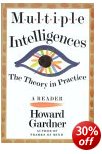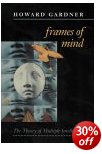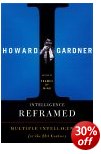|
|
|
|
Multiple Intelligences
By incorporating into
the learning experience a mixture of activities that meet the 8 different
styles of learning ensures maximum effectiveness, input and retention.
There are 8 learning
styles or intelligences as researched and published by Howard Gardner:
Musical, Kinaesthetic,
Mathematical / Logical,
Visual / Spatial, Linguistic,
Interpersonal, Intrapersonal
and Naturalist. In the following
pages you can learn more about each intelligence and suggestions on how
to develop these further.
Linguistic
Intelligence
From a very early age
we have all been encouraged to develop the art of communication. Even
if we do not consider ourselves to be particularly talented, we have at
least learned sufficient so as to interact fairly successfully with others.
There are however, individuals who have developed their linguistic skills
to the point where it becomes an art. They have the ability to write and/or
talk fluently, utilising a broad vocabulary to express the precise meaning
of what they wish to convey and they can speak almost melodically with
changing intonations and rhythms of sound to express feelings and promote
memory.
The precise definition
of Linguistic Intelligence has been defined by Howard Gardener as sensitivity
to the meaning of words, the order among words, sounds, rhythms, inflections,
different functions of language, phonology, syntax and pragmatic.
Individuals with Linguistic
Intelligence will have one or more of the following skills:-
- Express Sensitivity
- The ability to listen carefully to others language and language patterns
and to communicate expressively (primarily orally) with appropriate
sensitivity.
- Rhetorical Skills
- The ability to use language as a tool for persuasion and effect through
negotiation.
- Literature Skills
- The ability to choose words well when writing in order to generate
the right emotional tone for example when writing letters, poems, stories
or when creating reports.
- A good verbal memory
for what is read, spoken or written.
The advantages of developing
ones Linguistic Intelligence further are many. We use language to explain,
persuade, sell, argue, speak publicly, describe, write and so on. It is
a skill used extensively by lawyers, politicians, businessmen –
and London taxi drivers!
Develop Your Linguistic Intelligence by:
The advantages of developing
ones Linguistic Intelligence further are many. We use language to explain,
persuade, sell, argue, speak publicly, describe, write and so on.
Following is a list
of activities that have been designed to help improve Linguistic Intelligence.
Have a look through each item and perhaps try a few activities that you
feel may help improve an area that you consider to be weak and that you
would like to strengthen.
- Hold Trivial Pursuits
parties
- Play word games
(e.g. scrabble, anagrams, crosswords, up words)
- Join a book club
- Attend a workshop
on writing through a local college
- Record yourself
speaking into a tape recorder and listen to the playback
- Visit the library
and bookshops regularly
- Join a speaker’s
club
- Subscribe to a high-quality
newspaper
- Read a book a week
- Prepare an informal
ten-minute talk for a business or community event
- Learn to use a word
processor
- Listen and watch
recordings of famous orators, e.g. Martin Luther King, Winston Churchill,
Adolf Hitler
- Keep a daily diary
or write 250 words a day about anything on your mind
- Tape yourself talking
out loud about how to solve logical or mathematical problems
- Pay attention to
the different verbal styles (dialects, slang expressions, intonations
and vocabularies) of different people you meet
- Find opportunities
to tell stories to children (and adults!)
- Make up your own
riddles, puns and jokes
- Attend a speed-reading
seminar
- Teach an illiterate
person to read through a voluntary organisation
- Memorise favourite
poetry or prose passages
- Rent, borrow or
buy audio recordings of great literature and listen to them as you commute
to work, or during other ‘dead time’, e.g. Shakespeare,
Dickens, Wordsworth, Austin, Bronte, Steinbeck, Orwell, Hemmingway,
Lawrence, Chaucer
- Circle unfamiliar
words you encounter during your reading and look them up
- Buy a thesaurus,
a book of word origins and a style manual and use them regularly in
your writing
- Use one new word
in your conversation every day.
To further develop your learning styles we strongly recommend the following:
 Multiple Intelligences- Howard Gardner Multiple Intelligences- Howard Gardner
Howard Gardners brilliant conception of individual competence is changing the face of education today. In the ten years since the publication of his seminal Frames of Mind , thousands of educators, parents, and researchers have explored the practical implications of Multiple Intelligences (MI) theory the powerful notion that there are separate human capacities, ranging from musical intelligence to the intelligence involved in understanding oneself. Multiple Intelligences: The Theory in Practice brings together previously published and original work by Gardner and his colleagues at Project Zero.
 Frames of Mind: Theory of Multiple Intelligences - Howard Gardner Frames of Mind: Theory of Multiple Intelligences - Howard Gardner
The author demonstrates that there exist many human "intelligences", common to all cultures - each with its own pattern of development and brain activity, and each different in kind from the others. These potentials include linguistic, musical and logical/mathematical capacities, as well as spatial and bodily intelligences, and the ability to arrive at an emotional and mental sense of self and other people. Rather than reducing an individual's potential to a single score on an IQ test, it is the fostering and education of all these intelligences that should be our concern.
 Intelligence Reframed - Howard Gardner Intelligence Reframed - Howard Gardner
A brilliant state-of-the-art report on how the landmark theory of multiple intelligences is radically changing our understanding of education and human development. Now, in Intelligence Reframed, Gardner provides a much-needed state of the art report on the theory. He describes how it has evolved and been revised. He introduces two new intelligences, and argues that the concept of intelligence should be broadened, but not so much that it includes every human faculty and value.
Other Inspiring Breakthrough
Multiple Intelligences within this section;
Musical
Kinaesthetic
Logical Mathematical
Visual Spatial
Linguistic
Interpersonal
Intrapersonal
Individual
Performance Improvement
Team
Performance Improvement
Accelerated
Learning
Neuro
Linguistic Programming (NLP)
Business
Growth Performance
OUR
MISSION
Inspiring Breakthrough
aim to create behavioural change, within organisations, through inspiring
coaching and tailored development solutions. By empowering individual
breakthrough from perceived potential to the achievement of their true
potential.
Click here
to ask any questions about how we can help you improve your business.
|
|






